中医英语介绍
- 格式:docx
- 大小:801.55 KB
- 文档页数:6
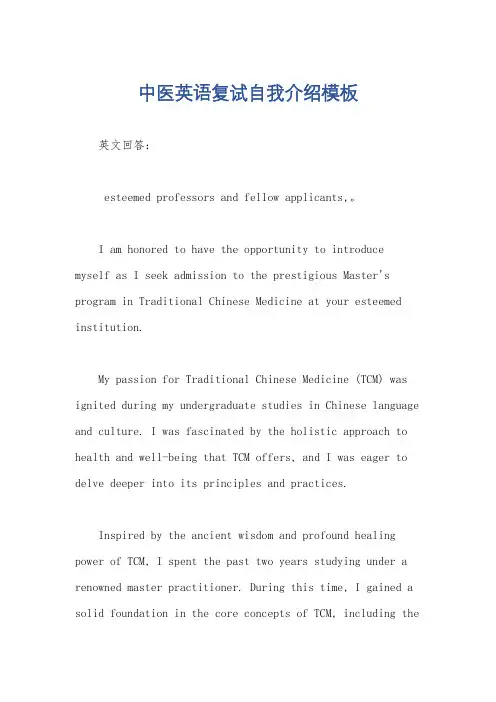
中医英语复试自我介绍模板英文回答:esteemed professors and fellow applicants,。
I am honored to have the opportunity to introduce myself as I seek admission to the prestigious Master's program in Traditional Chinese Medicine at your esteemed institution.My passion for Traditional Chinese Medicine (TCM) was ignited during my undergraduate studies in Chinese language and culture. I was fascinated by the holistic approach to health and well-being that TCM offers, and I was eager to delve deeper into its principles and practices.Inspired by the ancient wisdom and profound healing power of TCM, I spent the past two years studying under a renowned master practitioner. During this time, I gained a solid foundation in the core concepts of TCM, including thetheory of yin and yang, the five elements, and the channels and collaterals. I also mastered various TCM techniques, such as acupuncture, herbal medicine, and tuina massage.Through my clinical practice, I have witnessedfirsthand the transformative effects of TCM in addressing a wide range of health conditions. I have successfully treated patients with chronic pain, digestive disorders, allergies, and emotional imbalances. The ability to help people regain their health and well-being has been an incredibly rewarding and fulfilling experience.My research interests lie in the integration of TCM with Western medicine. I believe that by combining the strengths of both systems, we can provide patients with the most effective and holistic care possible. I amparticularly interested in exploring the use of TCM for the treatment of chronic diseases and mental health conditions.I am confident that I possess the knowledge, skills, and passion necessary to succeed in your rigorous program.I am also an enthusiastic learner who is always eager toexpand my knowledge and understanding of TCM. I am committed to upholding the highest ethical standards and to providing compassionate and effective care to my patients.I believe that my unique blend of academic background, clinical experience, and research interests make me anideal candidate for your program. I am confident that I can make a meaningful contribution to the field of TCM, and I am eager to learn from the renowned faculty and experienced practitioners at your institution.Thank you for your time and consideration. I look forward to the opportunity to further discuss my qualifications and aspirations with you.中文回答:各位尊敬的教授、亲爱的同学:我怀着崇敬的心情,向大家介绍我自己。
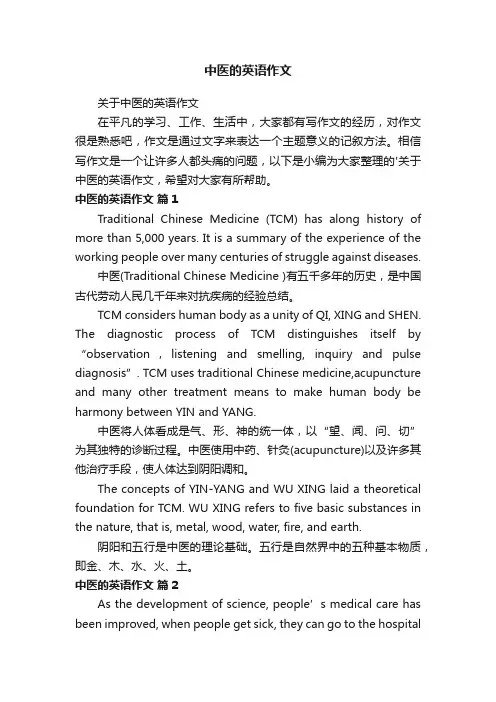
中医的英语作文关于中医的英语作文在平凡的学习、工作、生活中,大家都有写作文的经历,对作文很是熟悉吧,作文是通过文字来表达一个主题意义的记叙方法。
相信写作文是一个让许多人都头痛的问题,以下是小编为大家整理的'关于中医的英语作文,希望对大家有所帮助。
中医的英语作文篇1Traditional Chinese Medicine (TCM) has along history of more than 5,000 years. It is a summary of the experience of the working people over many centuries of struggle against diseases.中医(Traditional Chinese Medicine )有五千多年的历史,是中国古代劳动人民几千年来对抗疾病的经验总结。
TCM considers human body as a unity of QI, XING and SHEN. The diagnostic process of TCM distinguishes itself by “observation,listening and smelling, inquiry and pulse diagnosis”. TCM uses traditional Chinese medicine,acupuncture and many other treatment means to make human body be harmony between YIN and YANG.中医将人体看成是气、形、神的统一体,以“望、闻、问、切”为其独特的诊断过程。
中医使用中药、针灸(acupuncture)以及许多其他治疗手段,使人体达到阴阳调和。
The concepts of YIN-YANG and WU XING laid a theoretical foundation for TCM. WU XING refers to five basic substances in the nature, that is, metal, wood, water, fire, and earth.阴阳和五行是中医的理论基础。
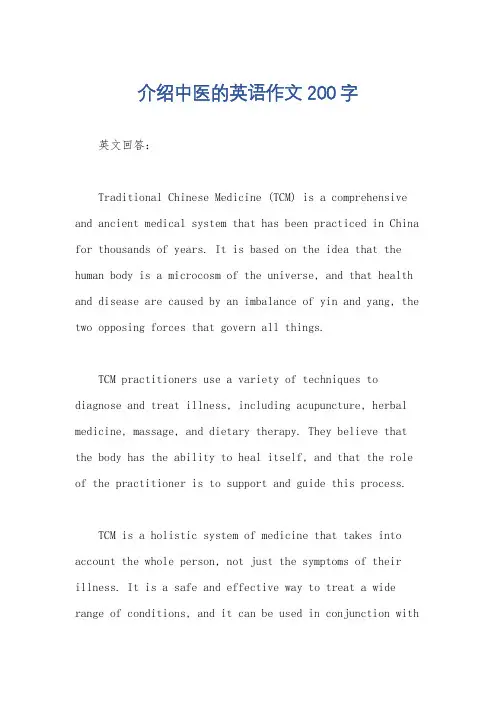
介绍中医的英语作文200字英文回答:Traditional Chinese Medicine (TCM) is a comprehensive and ancient medical system that has been practiced in China for thousands of years. It is based on the idea that the human body is a microcosm of the universe, and that health and disease are caused by an imbalance of yin and yang, the two opposing forces that govern all things.TCM practitioners use a variety of techniques to diagnose and treat illness, including acupuncture, herbal medicine, massage, and dietary therapy. They believe that the body has the ability to heal itself, and that the role of the practitioner is to support and guide this process.TCM is a holistic system of medicine that takes into account the whole person, not just the symptoms of their illness. It is a safe and effective way to treat a wide range of conditions, and it can be used in conjunction withWestern medicine.中文回答:中医是中国传统医学,是中国古代一门以阴阳五行学说、脏腑经络学说为基础,研究人体生理、病理、诊断、治疗预防等方面的医学科学。
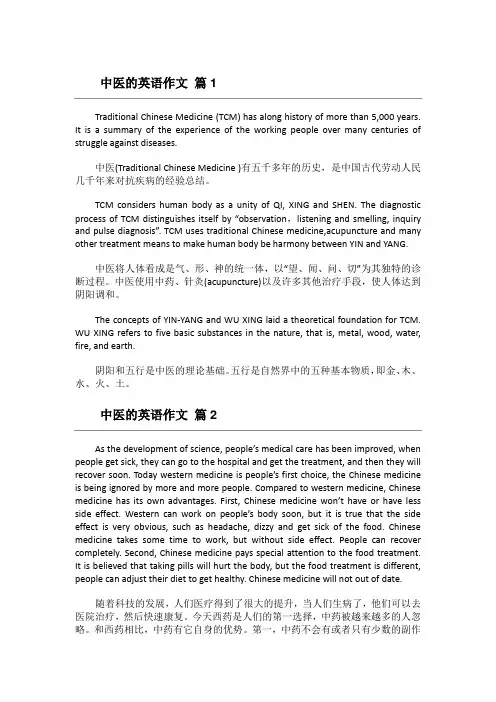
中医的英语作文篇1Traditional Chinese Medicine (TCM) has along history of more than 5,000 years. It is a summary of the experience of the working people over many centuries of struggle against diseases.中医(Traditional Chinese Medicine )有五千多年的历史,是中国古代劳动人民几千年来对抗疾病的经验总结。
TCM considers human body as a unity of QI, XING and SHEN. The diagnostic process of TCM distinguishes itself by “observation,listening and smelling, inquiry and pulse diagnosis”. TCM uses traditional Chinese medicine,acupuncture and many other treatment means to make human body be harmony between YIN and YANG.中医将人体看成是气、形、神的统一体,以“望、闻、问、切”为其独特的诊断过程。
中医使用中药、针灸(acupuncture)以及许多其他治疗手段,使人体达到阴阳调和。
The concepts of YIN-YANG and WU XING laid a theoretical foundation for TCM. WU XING refers to five basic substances in the nature, that is, metal, wood, water, fire, and earth.阴阳和五行是中医的理论基础。
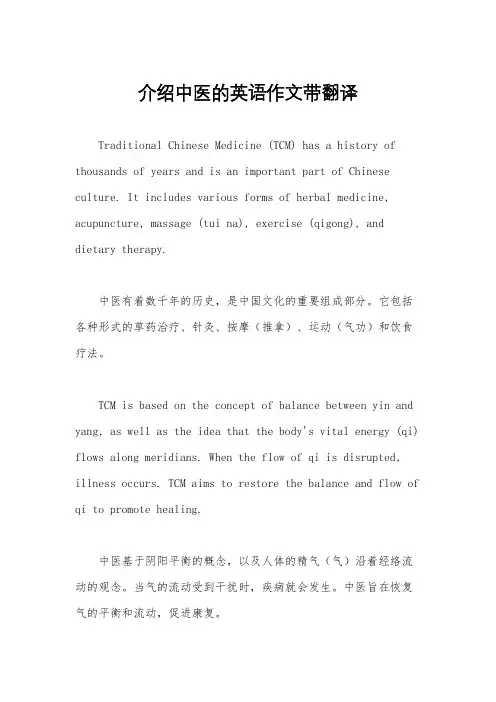
介绍中医的英语作文带翻译Traditional Chinese Medicine (TCM) has a history of thousands of years and is an important part of Chinese culture. It includes various forms of herbal medicine, acupuncture, massage (tui na), exercise (qigong), and dietary therapy.中医有着数千年的历史,是中国文化的重要组成部分。
它包括各种形式的草药治疗、针灸、按摩(推拿)、运动(气功)和饮食疗法。
TCM is based on the concept of balance between yin and yang, as well as the idea that the body's vital energy (qi) flows along meridians. When the flow of qi is disrupted, illness occurs. TCM aims to restore the balance and flow of qi to promote healing.中医基于阴阳平衡的概念,以及人体的精气(气)沿着经络流动的观念。
当气的流动受到干扰时,疾病就会发生。
中医旨在恢复气的平衡和流动,促进康复。
One of the most well-known practices of TCM is acupuncture, which involves inserting thin needles into specific points on the body to stimulate the flow of qi. This can help with pain relief, stress reduction, and overall wellness.中医最著名的实践之一是针灸,它涉及在身体特定穴位插入细针以刺激气的流动。
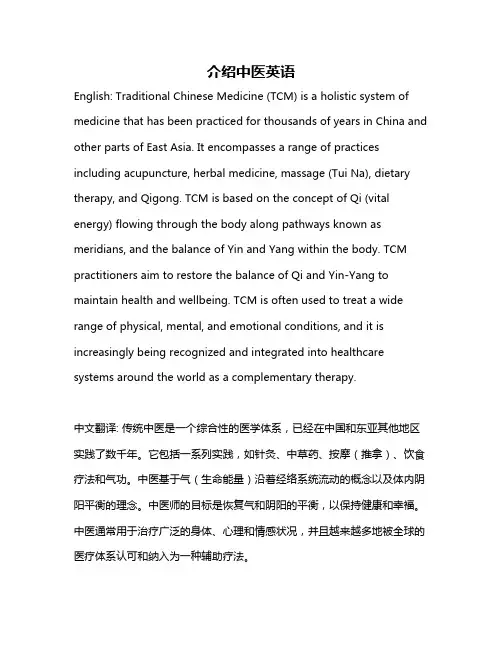
介绍中医英语English: Traditional Chinese Medicine (TCM) is a holistic system of medicine that has been practiced for thousands of years in China and other parts of East Asia. It encompasses a range of practices including acupuncture, herbal medicine, massage (Tui Na), dietary therapy, and Qigong. TCM is based on the concept of Qi (vital energy) flowing through the body along pathways known as meridians, and the balance of Yin and Yang within the body. TCM practitioners aim to restore the balance of Qi and Yin-Yang to maintain health and wellbeing. TCM is often used to treat a wide range of physical, mental, and emotional conditions, and it is increasingly being recognized and integrated into healthcare systems around the world as a complementary therapy.中文翻译: 传统中医是一个综合性的医学体系,已经在中国和东亚其他地区实践了数千年。
它包括一系列实践,如针灸、中草药、按摩(推拿)、饮食疗法和气功。
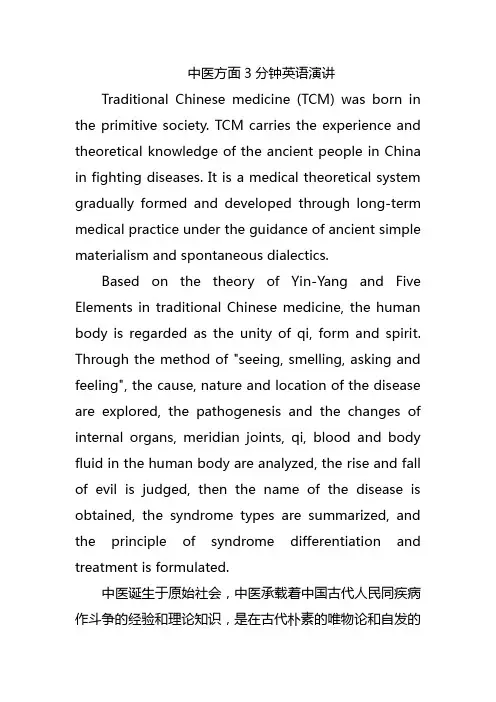
中医方面3分钟英语演讲Traditional Chinese medicine (TCM) was born in the primitive society. TCM carries the experience and theoretical knowledge of the ancient people in China in fighting diseases. It is a medical theoretical system gradually formed and developed through long-term medical practice under the guidance of ancient simple materialism and spontaneous dialectics.Based on the theory of Yin-Yang and Five Elements in traditional Chinese medicine, the human body is regarded as the unity of qi, form and spirit. Through the method of "seeing, smelling, asking and feeling", the cause, nature and location of the disease are explored, the pathogenesis and the changes of internal organs, meridian joints, qi, blood and body fluid in the human body are analyzed, the rise and fall of evil is judged, then the name of the disease is obtained, the syndrome types are summarized, and the principle of syndrome differentiation and treatment is formulated.中医诞生于原始社会,中医承载着中国古代人民同疾病作斗争的经验和理论知识,是在古代朴素的唯物论和自发的辩证法思想指导下,通过长期医疗实践逐步形成并发展成的医学理论体系。
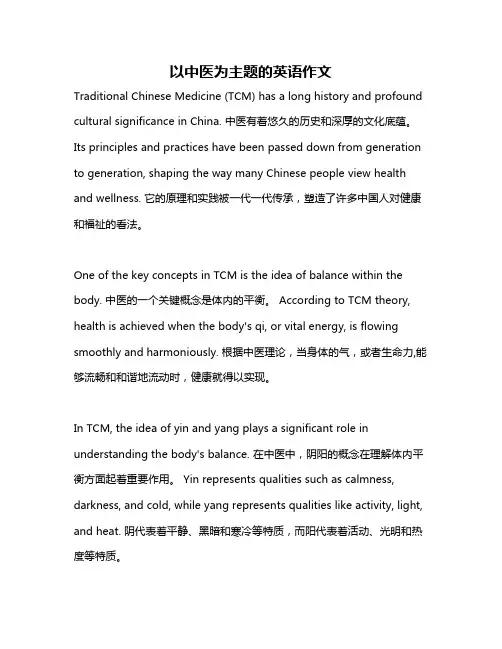
以中医为主题的英语作文Traditional Chinese Medicine (TCM) has a long history and profound cultural significance in China. 中医有着悠久的历史和深厚的文化底蕴。
Its principles and practices have been passed down from generation to generation, shaping the way many Chinese people view health and wellness. 它的原理和实践被一代一代传承,塑造了许多中国人对健康和福祉的看法。
One of the key concepts in TCM is the idea of balance within the body. 中医的一个关键概念是体内的平衡。
According to TCM theory, health is achieved when the body's qi, or vital energy, is flowing smoothly and harmoniously. 根据中医理论,当身体的气,或者生命力,能够流畅和和谐地流动时,健康就得以实现。
In TCM, the idea of yin and yang plays a significant role in understanding the body's balance. 在中医中,阴阳的概念在理解体内平衡方面起着重要作用。
Yin represents qualities such as calmness, darkness, and cold, while yang represents qualities like activity, light, and heat. 阴代表着平静、黑暗和寒冷等特质,而阳代表着活动、光明和热度等特质。
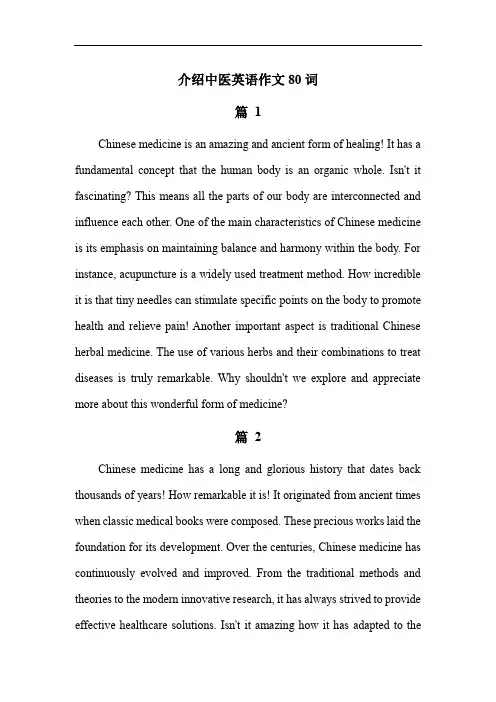
介绍中医英语作文80词篇1Chinese medicine is an amazing and ancient form of healing! It has a fundamental concept that the human body is an organic whole. Isn't it fascinating? This means all the parts of our body are interconnected and influence each other. One of the main characteristics of Chinese medicine is its emphasis on maintaining balance and harmony within the body. For instance, acupuncture is a widely used treatment method. How incredible it is that tiny needles can stimulate specific points on the body to promote health and relieve pain! Another important aspect is traditional Chinese herbal medicine. The use of various herbs and their combinations to treat diseases is truly remarkable. Why shouldn't we explore and appreciate more about this wonderful form of medicine?篇2Chinese medicine has a long and glorious history that dates back thousands of years! How remarkable it is! It originated from ancient times when classic medical books were composed. These precious works laid the foundation for its development. Over the centuries, Chinese medicine has continuously evolved and improved. From the traditional methods and theories to the modern innovative research, it has always strived to provide effective healthcare solutions. Isn't it amazing how it has adapted to thechanging times while still retaining its essence? The wisdom and experience accumulated over the millennia have made Chinese medicine a unique and invaluable treasure in the field of healthcare. How fortunate we are to have such a profound medical heritage!篇3Oh my goodness! Have you ever thought about the amazing role of traditional Chinese medicine in our daily lives? Well, let me tell you! Traditional Chinese medicine is not just some ancient stuff, but a wonderful treasure. For instance, it helps us adjust our bodies and prevent diseases. My friend had always been weak and often fell ill. But after following the advice of a traditional Chinese medicine doctor and taking some herbal remedies, she became much healthier and more energetic! Isn't that amazing? We should really appreciate and make good use of this precious wisdom of traditional Chinese medicine. How wonderful it is to have such a powerful tool for a better life!篇4Traditional Chinese Medicine (TCM), an age-old practice, has been seamlessly integrating with modern medicine, bringing about remarkable results! How amazing is that? For instance, in the treatment of chronic diseases like diabetes, TCM's herbal remedies and acupuncture can regulate the body's internal balance, while modern medicine providesprecise monitoring and medication. Isn't it a perfect combination? Another case is in mental health. TCM's mind-calming techniques and herbal tonics complement the psychotherapy and medication of modern medicine. This synergy not only enhances the therapeutic effect but also offers patients more diverse and personalized treatment options. Isn't it wonderful? The integration of TCM and modern medicine truly holds great promise for improving healthcare and bringing hope to countless patients!篇5Oh my goodness! Have you ever heard of Traditional Chinese Medicine (TCM)? It's truly amazing! TCM has unique theories, such as the theory of Yin and Yang and the Five Elements. Let me explain it to you in a simple way. Imagine Yin and Yang as two sides of a scale. When they are in balance, our health is good! But if Yin is too strong or Yang is too weak, problems may arise. Isn't that interesting? How important it is to keep this balance for a healthy life! TCM believes that by adjusting this balance, we can prevent and treat diseases. So, TCM is not just about medicine, it's a profound wisdom about life and health. Wow, isn't it fascinating?。
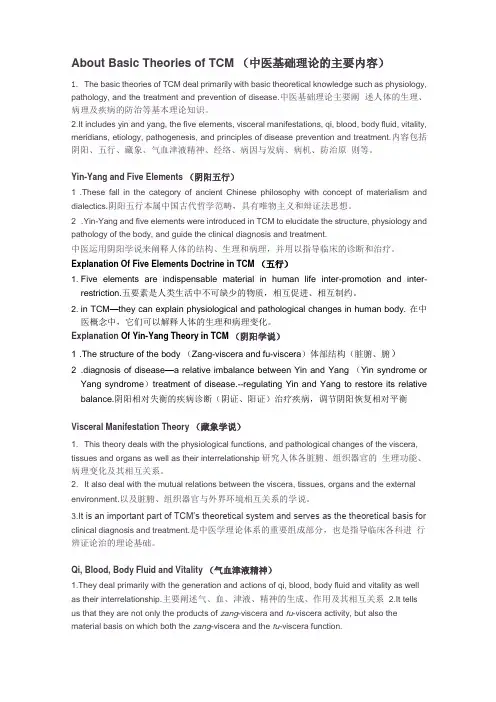
About Basic Theories of TCM (中医基础理论的主要内容)1. The basic theories of TCM deal primarily with basic theoretical knowledge such as physiology, pathology, and the treatment and prevention of disease.中医基础理论主要阐述人体的生理、病理及疾病的防治等基本理论知识。
2.It includes yin and yang, the five elements, visceral manifestations, qi, blood, body fluid, vitality, meridians, etiology, pathogenesis, and principles of disease prevention and treatment.内容包括阴阳、五行、藏象、气血津液精神、经络、病因与发病、病机、防治原则等。
Yin-Yang and Five Elements (阴阳五行)1 .These fall in the category of ancient Chinese philosophy with concept of materialism and dialectics.阴阳五行本属中国古代哲学范畴,具有唯物主义和辩证法思想。
2 .Yin-Yang and five elements were introduced in TCM to elucidate the structure, physiology and pathology of the body, and guide the clinical diagnosis and treatment.中医运用阴阳学说来阐释人体的结构、生理和病理,并用以指导临床的诊断和治疗。
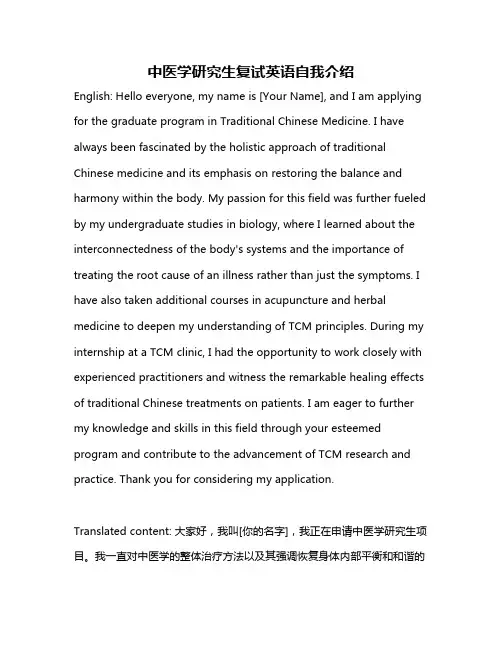
中医学研究生复试英语自我介绍English: Hello everyone, my name is [Your Name], and I am applying for the graduate program in Traditional Chinese Medicine. I have always been fascinated by the holistic approach of traditional Chinese medicine and its emphasis on restoring the balance and harmony within the body. My passion for this field was further fueled by my undergraduate studies in biology, where I learned about the interconnectedness of the body's systems and the importance of treating the root cause of an illness rather than just the symptoms. I have also taken additional courses in acupuncture and herbal medicine to deepen my understanding of TCM principles. During my internship at a TCM clinic, I had the opportunity to work closely with experienced practitioners and witness the remarkable healing effects of traditional Chinese treatments on patients. I am eager to further my knowledge and skills in this field through your esteemed program and contribute to the advancement of TCM research and practice. Thank you for considering my application.Translated content: 大家好,我叫[你的名字],我正在申请中医学研究生项目。
简单用英语介绍中医Traditional Chinese medicine (TCM) is a comprehensive medical system that originated in ancient China. It is a holistic approach to healthcare that has been practiced for thousands of years.TCM is based on the belief that the body is a complex system of interconnected parts, and that balance is key to maintaining good health. It emphasizes the idea of yin and yang, which are opposing forces that need to be balanced in order for the body to function properly. In TCM, the body is also seen as a network of energy pathways called meridians, through which qi (vital energy) flows.Treatment in TCM often includes a combination of different therapies, such as herbal medicine, acupuncture, massage, and dietary therapy. Herbal medicine uses natural substances, such as plant roots, leaves, and flowers, to restore balance and promote healing. Acupuncture involves inserting thin needles into specific points on the body to stimulate the flow of qi and restore balance. Massage and dietary therapy focus on promoting overall well-being and maintaining a healthy lifestyle.TCM is known for its holistic approach, taking into consideration not only physical symptoms but also emotional and mental aspects of health. It aims to treat the root cause of illness, rather than just alleviating symptoms. TCM practitioners often work closely with patients to develop an individualized treatment plan that addresses their unique needs.In recent years, TCM has gained recognition and popularity worldwide, with many people seeking its natural and holisticapproach to healthcare. It is often used as a complementary therapy alongside conventional medicine for a wide range of conditions, including pain management, digestive disorders, respiratory conditions, stress, and anxiety.Overall, TCM offers a unique perspective on healthcare, focusing on restoring balance and harmony within the body. Its ancient wisdom and holistic approach continue to play an important role in promoting health and well-being in today's world.。
中医四诊英语介绍范文大全The Four Diagnoses of Traditional Chinese Medicine (TCM) include inspection, listening and smelling, inquiry, and palpation. These four methods are used by TCM practitioners to gather information about a patient's health in order to make a diagnosis and create a treatment plan. Let's take a closer look at each of these four diagnostic techniques.Firstly, inspection is the process of visually examining the patient's body, including the complexion, tongue, and the shape, color, and coating of the tongue. In TCM, the tongue is believed to reflect the overall health of the body, and different characteristics of the tongue can indicate various imbalances or illnesses. For example, a red tongue with a yellow coating may indicate excess heat in the body, while a pale tongue may indicate a deficiency of qi or blood. The complexion is also observed to assess the patient's overall vitality and health.Secondly, listening and smelling involve payingattention to a patient's voice, breathing, and any odors that may be present. The sound and quality of a patient's voice, as well as their breathing patterns, can providevaluable information about the state of their internal organs and energy flow. Additionally, any unusual odors emanating from the patient's body or breath may also indicate specific imbalances or illnesses. TCMpractitioners are trained to listen for subtle changes in these factors to aid in their diagnosis.Thirdly, inquiry is the process of asking the patient questions about their symptoms, medical history, lifestyle, and emotional state. TCM takes into account the interconnectedness of the body and mind, and believes that emotional and psychological factors can greatly impactone's physical health. By gathering detailed information about the patient's daily habits, stress levels, and emotions, the practitioner can gain a more comprehensive understanding of the root causes of the patient's health issues.Lastly, palpation involves the TCM practitioner using their hands to feel the patient's body, including the pulse and various acupuncture points. The pulse is considered a direct reflection of the state of the internal organs and energy channels, and TCM practitioners are trained todetect subtle variations in the pulse that can indicate specific imbalances or pathologies. Palpation of acupuncture points can also provide valuable information about the flow of energy in the body and any areas of blockage or stagnation.中医四诊包括望、闻、问、切。
中医介绍自己,作文,英语English:I am a Traditional Chinese Medicine practitioner with a passion for helping individuals achieve holistic wellness through natural healing methods. With a background in Chinese medicine and acupuncture, I have dedicated my career to addressing the root causes of health issues rather than merely treating symptoms. I believe in the body's innate ability to heal itself when given the right support, whether through acupuncture, herbal remedies, dietary changes, or lifestyle modifications. My goal is to empower my patients to take control of their health and wellbeing by providing them with personalized treatment plans tailored to their unique needs. By combining ancient wisdom with modern knowledge, I strive to offer comprehensive and effective solutions for a wide range of health concerns. Through continuous learning and ongoing research, I am committed to staying up-to-date with the latest developments in the field of Traditional Chinese Medicine to deliver the highest quality care to my patients.中文翻译:我是一名中医师,热衷于通过自然疗法帮助个体实现整体健康。
中医药主题英语作文带翻译Chinese Medicine。
Chinese medicine, also known as Traditional Chinese Medicine (TCM), is a unique and holistic approach to healthcare that has been practiced for thousands of years in China. It encompasses various forms of treatments, including acupuncture, herbal medicine, massage, and dietary therapy.Acupuncture, perhaps the most well-known aspect of Chinese medicine, involves the insertion of thin needles into specific points on the body. It is believed to stimulate the flow of energy, or Qi, along the body's meridians, and restore balance and harmony. Many people find acupuncture to be a highly effective treatment for a wide range of conditions, from pain relief to stress reduction.Herbal medicine is another integral part of Chinesemedicine. It involves the use of natural substances, suchas plants, minerals, and animal products, to treat and prevent illnesses. Chinese herbal formulas are carefully crafted to address each individual's unique symptoms and imbalances. The use of herbal medicine can be traced back thousands of years and continues to be a popular and effective treatment option in China and around the world.Massage, or Tui Na, is a form of Chinese therapeutic bodywork that involves various techniques, such as kneading, pressing, and stretching. It is used to promote the flow of Qi and blood, relieve muscle tension, and improve overall well-being. Tui Na is often combined with acupuncture for a more comprehensive treatment approach.Dietary therapy is an important aspect of Chinese medicine that emphasizes the importance of food as medicine. It involves the use of specific foods and cooking methodsto promote health and prevent disease. For example, certain foods are believed to have warming or cooling properties, and can be used to balance the body's energy. Dietary therapy is tailored to each individual's constitution andhealth condition.Chinese medicine is based on the concept of Yin and Yang, which represent opposite but complementary forces in the universe. It views health as a state of balance between these two forces, and illness as a result of their imbalance. Chinese medicine aims to restore this balance through various treatments and lifestyle adjustments.In recent years, Chinese medicine has gained recognition and popularity in the Western world. Many people are turning to Chinese medicine as a complementary or alternative approach to conventional medicine. Its holistic nature and focus on individualized care make it an appealing option for those seeking a more natural and personalized approach to healthcare.In conclusion, Chinese medicine offers a unique and comprehensive approach to healthcare that has stood thetest of time. Its various forms of treatments, such as acupuncture, herbal medicine, massage, and dietary therapy, provide a holistic and individualized approach to promotinghealth and well-being. Whether used as a standalone treatment or in combination with conventional medicine, Chinese medicine offers a valuable and effective approach to healthcare.。
中医的英语介绍作文Traditional Chinese medicine, or TCM, has a history of thousands of years and is based on the principles of Yin and Yang, the Five Elements, and Qi energy. TCM believes that the body should be in balance in order to achieve health and wellness.One of the key components of TCM is acupuncture, which involves inserting thin needles into specific points on the body to stimulate energy flow and promote healing. Acupuncture is often used to treat pain, digestive issues, and stress-related conditions.Herbal medicine is another important aspect of TCM, with hundreds of herbs used to create customized formulas for each individual's unique health needs. These herbs are believed to have specific properties that can help rebalance the body and treat various ailments.In addition to acupuncture and herbal medicine, TCMalso includes practices such as cupping, moxibustion, and tai chi. Cupping involves placing cups on the skin to create suction and promote blood flow, while moxibustion involves burning herbs near the skin to warm and stimulate energy flow.Overall, TCM takes a holistic approach to health, focusing on the interconnectedness of the body, mind, and spirit. By addressing the root causes of illness and promoting balance within the body, TCM aims to prevent disease and promote overall well-being.。
向你的朋友介绍中医英语作文Hey there, I just wanted to tell you about this fascinating medical practice I've been learning about: Traditional Chinese Medicine (TCM). It's been around for thousands of years and it's still going strong.TCM is based on the concept of balancing the body's natural energies, known as 'Qi'. It believes that health is maintained when this energy flows smoothly through the body.One of the key components of TCM is acupuncture, where tiny needles are inserted into specific points on the body to help restore balance. It's not just needles though, TCM also includes herbal remedies, dietary therapy, and even exercises like Tai Chi.I've been trying out some of the herbal teas and they're quite tasty. They're tailored to specific health needs and can help with everything from digestion to boosting the immune system.Another cool thing about TCM is that it's not just about treating symptoms. It's about understanding the root cause of an issue and addressing it holistically.It's not just an alternative medicine; it's a complete system of health and wellness that has been passed down through generations. I think it's worth looking into ifyou're interested in natural ways to improve your health.So, next time you're feeling a bit under the weather or just want to maintain good health, consider giving TCM a try. Who knows, it might just be the key to a happier andhealthier you!。
中医英语介绍Revised on November 25, 2020About Basic Theories of TCM(中医基础理论的主要内容)1.The basic theories of TCM deal primarily with basic theoretical knowledge such as physiology, pathology, and the treatment and prevention of disease.中医基础理论主要阐述人体的生理、病理及疾病的防治等基本理论知识。
includes yin and yang, the five elements, visceral manifestations, qi, blood, body fluid, vitality, meridians, etiology, pathogenesis, and principles of disease prevention and treatment.内容包括阴阳、五行、藏象、气血津液精神、经络、病因与发病、病机、防治原则等。
Yin-Yang and Five Elements(阴阳五行)fall in the category of ancient Chinese philosophy with concept of materialism and dialectics. 阴阳五行本属中国古代哲学范畴,具有唯物主义和辩证法思想。
and five elements were introduced in TCM to elucidate the structure, physiology and pathology of the body, and guide the clinical diagnosis and treatment.中医运用阴阳学说来阐释人体的结构、生理和病理,并用以指导临床的诊断和治疗。
Explanation Of Five Elements Doctrine in TCM(五行)1. Five elements are indispensable material in human life inter-promotion and inter-restriction.五要素是人类生活中不可缺少的物质,相互促进、相互制约。
2. in TCM—they can explain physiological and pathological changes in human body.在中医概念中,它们可以解释人体的生理和病理变化。
Explanation Of Yin-Yang Theory in TCM(阴阳学说)structure of the body (Zang-viscera and fu-viscera)体部结构(脏腑、腑)of disease—a relative imbalance between Yin and Yang (Yin syndrome or Yang syndrome)treatment of Yin and Yang to restore its relative balance.阴阳相对失衡的疾病诊断(阴证、阳证)治疗疾病,调节阴阳恢复相对平衡Visceral Manifestation Theory(藏象学说)1. This theory deals with the physiological functions, and pathological changes of the viscera, tissues and organs as well as their interrelationship.研究人体各脏腑、组织器官的生理功能、病理变化及其相互关系。
2. It also deal with the mutual relations between the viscera, tissues, organs and the external environment. 以及脏腑、组织器官与外界环境相互关系的学说。
is an important part of TCM’s theoretical system and serves as the theoretical basis for clinical diagnosis and treatment.是中医学理论体系的重要组成部分,也是指导临床各科进行辨证论治的理论基础。
Qi, Blood, Body Fluid and Vitality(气血津液精神)deal primarily with the generation and actions of qi, blood, body fluid and vitality as well as their interrelationship. 主要阐述气、血、津液、精神的生成、作用及其相互关系tells us that they are not only the products of zang-viscera and fu-viscera activity, but also the material basis on which both the zang-viscera and the fu-viscera function.说明气、血、津液和精既是脏腑功能活动的产物,又是脏腑功能活动的物质基础。
Explanation(解释)1. Qi—the most essential substance making up the world and that everything in the universe was generated by the motion and change of Qi; the essential substance constituting the body and maintaining the life activities of the body.气-构成世界最基本的物质,宇宙万物都是由气的运动和变化产生的,是构成身体和维持身体生命活动的基本物质。
fluid—a basic substance constituting the body and plays an important role in maintaining its normal life activities. It include all normal liquid in the body, such as gastric juice, intestinal juice, nasal discharges, tears.体液是构成身体的一种基本物质,在维持其正常的生命活动中起着重要的作用。
它包括体内的所有正常液体,如胃液、肠液、鼻分泌物、泪液。
Meridian Theory(经络学说)theory deals with the physiology and pathology of the meridian system as well as the interrelationship of viscera.研究人体经络系统的生理功能、病理变化及其与脏腑相互关系的学说。
2. It is an important part of TCM’s basic theories. 是中医基础理论的重要组成部分。
meridians and its collaterals form an organic system which links up the exterior, interior, upper and lower parts of the body, connects the viscera, tissues and organs, and circulates qi and blood. 经络是人体沟通表里上下、联络脏腑组织器官、通行气血的一个有机体系。
Etiology and Pathogenesis(病因与发病)1. The properties and characteristics of all types of pathogenic factors as well as the clinical manifestations of resulting diseases are explained within this theory.主要阐述各种致病因素的性质、特点及所致病证的临床表现,tells us that disease occurs because of the imbalance of internal and external environment of the body.说明疾病的发生是由于人体内外环境失调所致。
Pathological Mechanism(病机)1. It elaborates the general law of pathological changes, including concepts of prosperity and decline of pathogenic factors.主要在于阐述病理变化的一般规律。
2. It includes yin and yang, abnormalities of qi, blood and body fluid, five endogenous evils,and disturbance of the viscera and meridians.包括邪正盛衰、阴阳失调、气血津液失常、内生五邪、脏腑经络功能失常等方面。
Principles of Treatment and Prevention(防治原则)1. It discusses the basic principles of treatment and prevention of diseases.防病和治病的基本法则。
2. The prevention principle is given top priority in TCM by upholding that prevention comes first. 中医学强调预防为主,主张“治未病”3. It is of great significance in controlling the onset and development of illnesses.对控制疾病的发生与发展具有重要意义4. The treatment principle incorporates a philosophy of finding and treating the root cause of an illness, increasing its own power of healing to resist and dispel pathogenic factors, and adjusting yin and yang to maintain their balance.治疗法则主要包括治病求本、扶正祛邪、调整阴阳等内容。